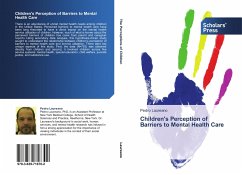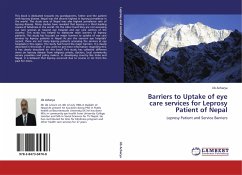There is an abundance of unmet mental health needs among children in the United States. Perceived barriers to mental health care have been long theorized to have a direct impact on the mental health service utilization of children. However, much of what is known about the perceived barriers of children has come from parent and caregiver reports. Using secondary data analysis, this hypothesis-driven study sought to understand the relationship between children s perception of barriers to mental health care and service utilization. There were two unique aspects of this study. First, the data (N=763) was obtained directly from children and second, it involved children across five service systems: mental health, special education, child welfare, juvenile justice, and substance use.
Bitte wählen Sie Ihr Anliegen aus.
Rechnungen
Retourenschein anfordern
Bestellstatus
Storno








